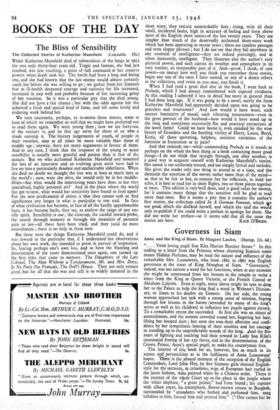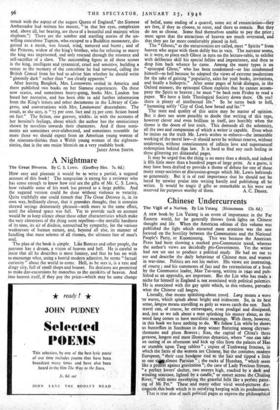Governess in Siam
Anna and the King of Siam. By Margaret Landon. (Harrap. 12s. 6d.) " . . . YOUR loving pupil Son Klin Harriet Beecher Stowe." In this ending to a letter from the Princess whose charming Siamese name meant Hidden Perfume, may be read the nature and influence of the remarkable Mrs. Leonowens, who from 1862 to 1867 was English governess at the court of King Monghut of Siam. "Governess," indeed, was too narrow a word for her functions, when at any moment she might be summoned from her lessons in the temple to write a letter from the King to Queen Victoria, or the French Consul or Abraham Lincoln. Even at night, noisy slaves might be sent to drag her to the Palace to help the king find a word in Webster's Diction- ary, or listen to his doubts on Genesis. On her side, the young woman approached her task with a strong sense of mission, hoping through her lessons in the harem (attended by many of the king's wives as well as his children) to influence her pupils against slavery. To a remarkable extent she succeeded. At first she was an object of astonishment, and the women crowded round her, fingering her hair, lifting her hooped skirt ; but soon she won their affection and confi- dence by her sympathetic hearing of their troubles and her courage in standing up to the unpredictable moods of the king. And the five years of fighting and teaching had their reward in Lady Son Kiln's ceremonial freeing of her 132 slaves, and in the determination of the Crown Prince, Anna's special pupil, to make his countrymen free. The interest of this book for us, however, lies as much in its scenes and personalities as in the fulfilment of Anna Leonowens' hopes. There is the absurd moment of the reception of the English Commodore, Lord John Hay, by five Siamese girls dressed English- style for the occasion, in crinolines, wigs of European hair curled in the latest fashion, skins painted white by a Chinese artist. There is the journey of the whole Court up to the place in the jungle where the white elephant, ca great prince," had teen found ; his capture with silken ropes, his triumphant, flower-strewn return to Bangkok, surrounded by "attendants who bathed and perfumed him, sang lullabies to him, fanned him and praised him." (" One cannot but be
struck with the aspect of the august Queen of England," the Siamese Ambassador had written his master, "in that her eyes, complexion and, above all, her bearing, are those of a beautiful and majestic white elephant.") There are the sombre and startling stories of the un- willing concubine Tuptim, who escaped to a Buddhist monastery, dis- guised as a monk, was found, tried, tortured and burnt ; and of the Princess, widow of the king's brother, who for refusing to marry the king was imprisoned, and only rescued through the resource and self-sacrifice of a slave. The outstanding figure in all these scenes is the king, intelligent and tyrannical, cruel and sensitive, building a statue to the memory of the concubine he had tortured, calling the British Consul from his bed to advise him whether he should write "gloomily dark" rather than "not clearly apparent."
After leaving Bangkok, Mrs. Leonowens settled in America and there published two books on her Siamese experiences. On these now scarce, and sometimes heavy-going, books Mrs. Landon has based her narrative, and has been able to add further information from the King's letters and other documents in the Library of Con- gress, and conversations with Mrs. Leonowens' descendants. The result, as she says, is "75 per cent, fact and 25 per cent. fiction based on fact." The fiction, one guesses, trickles in with the accounts of her heroine's feelings, about which the author has the omniscience shown by novelists towards their characters. And if these senti- ments are sometimes over-elaborated, and sometimes resemble far more those we should expect from an American young woman of the nineteen-thirties than a Welsh young woman of the eighteen- sixties, that is the one major blemish on a very readable book.
JANET ADAM SMITH.































 Previous page
Previous page